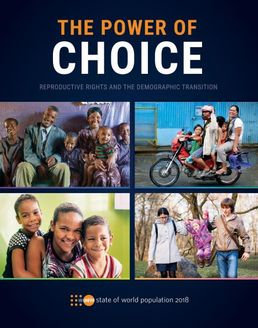 SWOP 2018. Copyright: UNFPA
SWOP 2018. Copyright: UNFPA The power to choose. That is the central theme of the 2018 State of the World Population (SWOP), the annual report of the UN fund on population, UNFPA, which was presented in the Belgian parliament on Nov 8th.
Individuals and couples need to be able to choose if, when and how many children they want. It sounds simple but it’s not. Reproductive rights are violated when health services are not able to provide essential care and means, such as contraceptives, or when women and young people have no access to information about relationships and sexuality. In these cases it is hard to prevent unplanned pregnancies.
Individuals and couples need to be able to choose if, when and how many children they want. It sounds simple but it’s not. Reproductive rights are violated when health services are not able to provide essential care and means, such as contraceptives, or when women and young people have no access to information about relationships and sexuality. In these cases it is hard to prevent unplanned pregnancies.
Desire to have children
Reproductive rights are also about realising one’s desire to have children. Economic barriers can undermine this right. Joblessness, poverty and/or under-paid jobs and lack of affordable nurseries can explain why people refrain from realising their desire to have a child. Institutional, economic and social factors can thus determine if couples and individuals have the power to make their own choices. Gender inequality is often the underlying problem.
Preference for smaller families
When people have the choice, the majority opts for smaller families, with an average of two children. With increased access to contraceptives there is a global tendency towards lower birth rates. Governments’ roles are important for this to happen. Their population policies can encourage family planning, invest in education – particularly for girls and women – and take measures to allow people to find the right work-life balance.
Population growth is a concern for governments of countries where the total number of children per woman exceeds 4. The bigger the population, the greater the needs for investments in health care, education and the economy. Reproductive rights thus benefit both individuals and countries as a whole.
Universal access to family planning by 2030
UNFPA calls on all countries to commit themselves to the reproductive rights of all citizens, so that nobody is left behind. Governments need to tackle the social, economic and institutional obstacles. All countries have committed to do so in 1994 already, with the recognition of reproductive rights at the International Conference on Population and Development held in Cairo. With the adoption of the 2030 Agenda for Sustainable Development, this commitment has been renewed, with the promise to realise universal access to family planning by 2030. Doing so requires governments to systematically integrate sexual and reproductive health services in primary health care, provide comprehensive sexuality education for all young persons and to fight gender inequality.
Reproductive rights are also about realising one’s desire to have children. Economic barriers can undermine this right. Joblessness, poverty and/or under-paid jobs and lack of affordable nurseries can explain why people refrain from realising their desire to have a child. Institutional, economic and social factors can thus determine if couples and individuals have the power to make their own choices. Gender inequality is often the underlying problem.
Preference for smaller families
When people have the choice, the majority opts for smaller families, with an average of two children. With increased access to contraceptives there is a global tendency towards lower birth rates. Governments’ roles are important for this to happen. Their population policies can encourage family planning, invest in education – particularly for girls and women – and take measures to allow people to find the right work-life balance.
Population growth is a concern for governments of countries where the total number of children per woman exceeds 4. The bigger the population, the greater the needs for investments in health care, education and the economy. Reproductive rights thus benefit both individuals and countries as a whole.
Universal access to family planning by 2030
UNFPA calls on all countries to commit themselves to the reproductive rights of all citizens, so that nobody is left behind. Governments need to tackle the social, economic and institutional obstacles. All countries have committed to do so in 1994 already, with the recognition of reproductive rights at the International Conference on Population and Development held in Cairo. With the adoption of the 2030 Agenda for Sustainable Development, this commitment has been renewed, with the promise to realise universal access to family planning by 2030. Doing so requires governments to systematically integrate sexual and reproductive health services in primary health care, provide comprehensive sexuality education for all young persons and to fight gender inequality.

 RSS Feed
RSS Feed